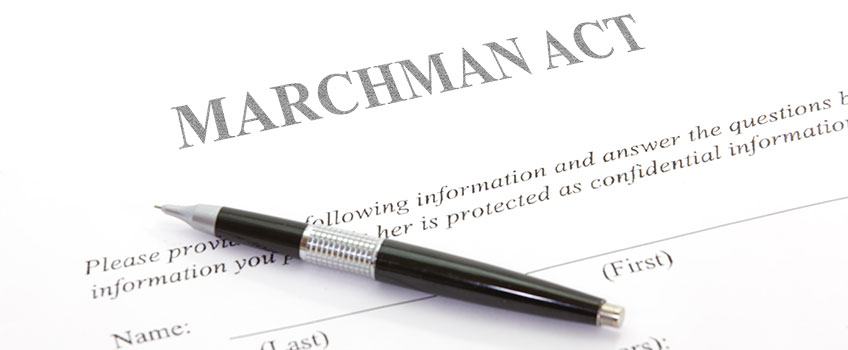The Marchman Act
Chapter 397 of the Florida Statutes is otherwise known as the “Hal S. Marchman Alcohol and Other Drug Services Act.” The law makes it possible to assess, stabilize, and treat individuals involuntarily who may be suffering from drug or alcohol abuse.
Our firm has extensive experience litigating Marchman Act matters and related issues. Our firm is unique in that we have consulted on behalf of the Petitioner and represented the Petitioner in these matters as well as defending the Respondent in hundreds of cases.
We are especially sensitive to the concerns of both parties, the Petitioner, and Respondent. As such we are better able to successfully direct our clients through the process to a successful conclusion.
What is a Marchman Act?
A Marchman Act is a court order for an individual to have an involuntary assessment and possibly involuntary treatment for substance abuse when the following conditions are met:
A Petition for involuntary assessment may be filed when there is reason to believe that a person is substance abuse impaired and:
- Because of the impairment, he or she has lost the power of self-control with respect to substance use;
- The person’s judgment is impaired because of substance abuse and he or she is incapable of appreciating the need for,and is unable to make a rational decision in regard to, substance abuse services;
- He or she has either; inflicted, attempted or threatened to inflict, or is likely to inflict unless admitted, physical harm on him or herself or another because of substance abuse.

Who Can File a Petition for a Marchman Act?
The Petition may be filed individually or by an attorney and can only be filed by:
- The person’s spouse or guardian, any relative of the person, a director of a licensed health service provider facility, a private health practitioner, or any adult who has personal knowledge of the person’s substance abuse impairment and his/her prior course of assessment and treatment.
- In the case of a minor, only the parents, legal guardian/custodian or licensed service provider can file a petition.



The Petitioner must be present at all hearings or the Petition may be Dismissed.
Retaining Counsel will help prevent that from happening.
What the Marchman Act CAN DO:
- After filing a petition for Involuntary Assessment or Treatment, a hearing is set within 5 days. The Respondent must be personally served with the Petition. Both the Petitioner and the Respondent are required to be present at the hearing.
- Under the Marchman Act an individual can be court ordered to involuntarily have an assessment for substance abuse. After the assessment is performed a second hearing is held to determine if the individual will be court ordered to involuntary treatment.
- The Respondent must be physically located in Palm Beach County. The Court may only send the Respondent to a licensed Marchman Act facility located in Palm Beach County. The Court may send the Respondent to an alternative facility outside of Palm Beach County if preparations are in place and can be agreed upon.
- If the assessment finds that the individual is in need of substance abuse treatment, the court can order the individual to attend and complete treatment, which can be inpatient or outpatient, depending on the recommendation of the assessing facility. The Court does not determine or recommend the type or the substance of the treatment. That determination is left to the treatment provider.
- The initial order for treatment is for up to 90 days; however, it can be extended if the individual needs more time to complete treatment upon the filing of a timely Petition supported by expert testimony at hearing or if the parties can agree on the issue.
What the Marchman Act CANNOT DO:
- The Marchman Act orders an individual for an assessment for substance abuse only; it is not an order for an evaluation of mental health issues. If the Respondent is in a mental health facility, the Marchman cannot be used to interfere with or substitute for the Respondent’s mental health treatment.
- The Marchman Act does not guarantee a bed for treatment. The Court does not have the ability to find a bed for the Respondent and to send the Respondent right from the hearing to a treatment The Court can order the Respondent to a treatment facility for immediate assessment and stabilization but once again if no bed is available the Respondent will be on a waiting list unless the Petitioner has an assessment or treatment bed pre-arranged .
- Marchman Act facilities are not “lock-down” facilities. If the individual who has been ordered to treatment decides to leave, the center has no authority to stop them. If an individual leaves treatment against medical advice (“AMA”) before completion, the individual will be ordered back in front of the Court for a contempt hearing.
- The Marchman Act does not pay for an individual’s assessment or treatment. Most providers have payment assistance based on income; be sure to contact the provider prior to the appointment about what is requires.
- An individual cannot be sent for substance abuse treatment to a correctional facility through the Marchman Act.
- The Marchman Act cannot supersede or interfere with any other court cases the individual may have pending. If the Respondent is charged with a crime or on probation, the Marchman Act cannot interfere with the criminal case or allow a Respondent to avoid a violation of probation. If the Respondent is in jail, the Marchman Act will not take precedence over their criminal charge and cannot be used to send the Respondent out of jail into treatment.
- The Marchman Act cannot be used to locate missing persons or runaway children. The Marchman Act cannot be used solely for the purpose of making a child attend school, keep curfew, or obey parents.
